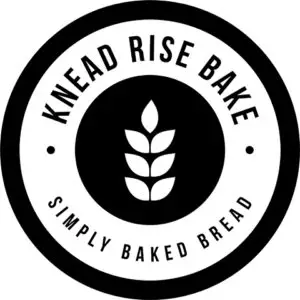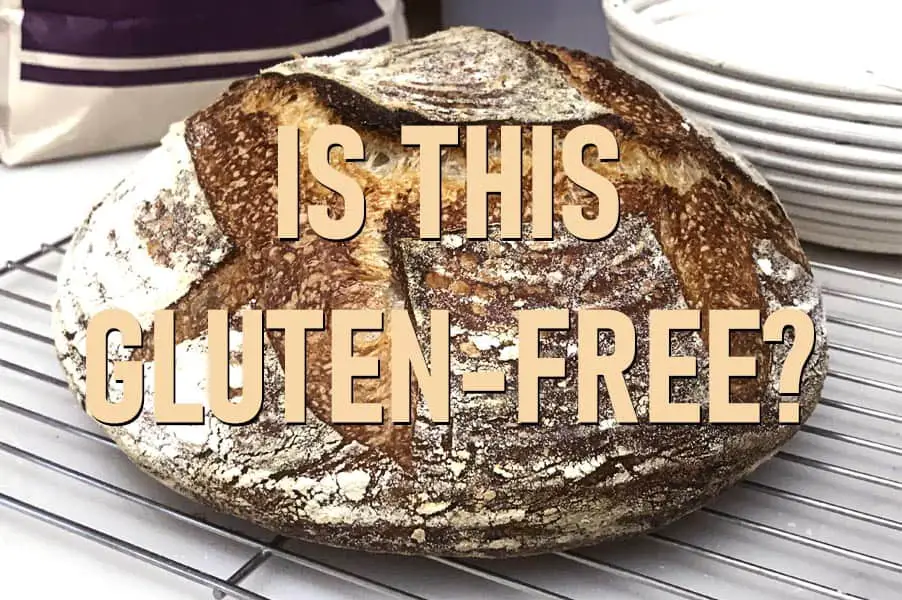This has become a pretty common question as there are a host of individuals who report that they cannot consume commercially yeasted bread but have zero issues with homemade sourdough. This they say is true even of sourdough made from wheat flour.
And that begs the question, is sourdough somehow gluten-free?
Sourdough, as traditionally made with wheat flour, is not considered a gluten-free food. Wheat flour contains protein strains that transform into gluten when it is combined with water. There isn’t any current research that suggests that the bacteria present in sourdough breaks down or cannibalizes gluten enough to fall under the 20ppm (parts per million) threshold to be classified as a gluten-free food.
The trademark chewy texture of a sourdough crumb (inside of loaf) is evidence enough to suggest that a significant amount of gluten must be present. Gluten is what really helps create the “chew” of bread. But I’m getting ahead of myself here, let’s start with what Gluten-Free technically is.
What Qualifies as Gluten-Free?
I’d like to argue that gluten-free should mean that there is zero gluten in it. But, I’m a simple man who likes simple things; and I’m not an expert here, so it’s not up to me to define. The actual experts state that manufacturers of food products, at least in the United States, can label their food as gluten-free when it is less than 20 parts of gluten for every million parts (20ppm).
In order for sourdough to be considered gluten-free, it would need to fall under that 20ppm threshold at a minimum and as we stated above, it doesn’t. It’s far less than the 80,000 ppm that regular yeasted bread tends to have, but still contains a significant amount at around 2,000 parts per million. That’s more than 100 times greater than current gluten-free standards in the U.S.
What Current Research Shows
Apparently, some small scale studies (one with just 6 people) have shown that some individuals with celiac disease don’t become ill after eating sourdough bread (2 people didn’t in the linked study above). But the two individuals who did not become ill did experience villous atrophy (flattening or disappearing stomach intestine villi). This suggests that even if some individuals are not becoming ill, they might be causing some potentially long-lasting complications from eating sourdough bread.
Recent studies are where I think a lot of the current exploration of the healthfulness of sourdough for gluten intolerant individuals is stemming from. More and more people and researchers are experimenting with sourdough and I fully expect more understanding to come from it.
As it stands though, the current research suggesting that sourdough might be safe for those with gluten intolerance is just far too small to be statistically significant. But what is clear, and backed by plenty of research, is that sourdough is NOT gluten-free.
This leaves many of us a bit baffled as to how many individuals who cannot tolerate commercially yeasted bread can tolerate sourdough. But more could be at play here than just gluten intolerance. Research suggests there are possibly more reasons for sourdough being more digestible than regular yeasted bread.
A report I found via Bon Apetit suggests that many individuals who have non-celiac gluten intolerances (this study was about individuals who self -report gluten-intolerance) might actually be reacting negatively to a carbohydrate called fructan, not gluten.
If that is the case, then the processes involved in sourdough bread could make it more digestible for those individuals. The chemistry of bread suggests that carbohydrate processing happens differently in sourdough than commercially yeasted bread. That might mean that fructon breaks down enough to be digestible for those who are sensitive to it.
But I think, from what we were able to find, there is a lot of room for more clarity to develop in this area before there are any definitive answers.
*Please note that we are not experts on gluten-intolerance. We are not even professional bakers. Just simple home bakers who fell in love with the craft and the endless questions it leads us to chase out. This is a complicated topic that should be discussed with a health professional.
But we do feel well acquainted with gluten and what it does for bread, not the body. All those good things that it does for bread are very much present in sourdough. Even though it has less, it still has plenty of it. As we said above, the chewy texture is a clear sign that gluten is present. Combine that chew with the light airy rise sourdough has, and you have textbook gluten-rich bread.
If you need gluten-free bread and want/need some sourdough, that is totally possible; but not with wheat flour. Check out the link below for a real natural yeast sourdough recipe that is gluten-free.
Wait, there is a Gluten-Free Option?
Yes, you absolutely can make gluten-free sourdough. And if you’re familiar with gluten-free bread, you likely can guess, it’s going to involve non-wheat flour blends and some eggs. 🙂
We’ll not even begin to pretend we’ve got this gluten-free sourdough thing on lockdown. We absolutely do not! Still quite green here when it comes to gluten-free anything (as we said, we know gluten). So we’ll send you over to the good people of, Beyond Celiac. Following that link will get you started on your very own gluten-free starter (yes, they exist) and then after just a few days, gluten-free sourdough bread! Give it a go, and let us know how it turns out!

